|
|
|
Sort Order |
|
|
|
Items / Page
|
|
|
|
|
|
|
| Srl | Item |
| 1 |
ID:
159286
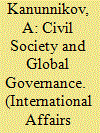

|
|
|
|
|
| Summary/Abstract |
THE WORLD faces a range of problems, among them new infectious diseases, growing poverty, environmental pollution, climate change, depletion of vital non-renewable energy resources, and dwindling reserves of drinking water. These problems affect everyone in the world and cause wide-scale concern, with civil society being one of the channels through which such concern is expressed.1 It is increasingly often argued that such problems cannot be solved without a system of global governance that would be based on values shared by people of all cultures, political views, religious beliefs, and philosophical principles. Not accidentally, this is one of the issues on the agenda of the United Nations - the organization has a specialized body for this purpose, the Commission on Global Governance.
|
|
|
|
|
|
|
|
|
|
|
|
|
|
|
|
| 2 |
ID:
146881
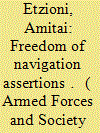

|
|
|
|
|
| Summary/Abstract |
In line with its “Freedom of Navigation” program, the United States conducts “operational assertions” by sending naval vessels to violate what it considers to be the excessive maritime claims of other states. Efforts have been made to legitimate this program to the public and elected officials on both liberal and realist grounds: Freedom of navigation is an important component of the liberal international order while also central to the exercise of U.S. naval power. However, it does not follow that military assertions, which create a security risk and are inconsistent with liberal principles, should take precedence over diplomatic and multilateral steps. Rather, the program has faced little scrutiny to date due to its relative obscurity.
|
|
|
|
|
|
|
|
|
|
|
|
|
|
|
|
| 3 |
ID:
180740


|
|
|
|
|
| Summary/Abstract |
INFORMATION and communication technologies (ICTs) provide humankind with unprecedented opportunities. Mass communication technologies, the Internet of Things, artificial intelligence, cloud computing, blockchain, big data, e-government, digital medicine, and cryptocurrencies have become part and parcel of our life.
|
|
|
|
|
|
|
|
|
|
|
|
|
|
|
|
| 4 |
ID:
151593
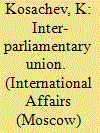

|
|
|
|
|
| Summary/Abstract |
"THE WORLD is made of achieved Utopias. Today's utopia is tomorrow's reality,"1 said Frederic Passy, winner of the first Nobel Peace Prize and one of the two co-founders (together with William Randal Cremer) of the oldest international parliamentary organization.
|
|
|
|
|
|
|
|
|
|
|
|
|
|
|
|
| 5 |
ID:
165679
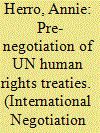

|
|
|
|
|
| Summary/Abstract |
Since 1965, nine UN human rights treaties have been adopted. Surprisingly, we know little about the conditions under which states arrived at the negotiation table because there has been no serious attempt to empirically identify the unique attributes of pre-negotiation in this context. This article examines the pre-negotiation of the UN Convention on the Rights of Persons (CRPD), drawing on diverse qualitative data sources such as interviews with state and non-state participants. Informed by a constructivist perspective, this study identifies esteem-seeking behavior as a key motivation for some states to negotiate. The article also shows how a transnational advocacy network influenced the pre-negotiation process by leveraging states’ esteem-seeking ambitions and appealing to their reputation as a way of pushing parties to negotiate. Additional tactics that the transnational advocacy network employ at the international level to expedite negotiations are also identified.
|
|
|
|
|
|
|
|
|
|
|
|
|
|
|
|
| 6 |
ID:
163376
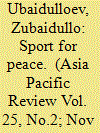

|
|
|
|
|
| Summary/Abstract |
“O Sport, You are Peace!
You forge happy bonds between the peoples
by drawing them together in reverence for strength
which is controlled, organised and self disciplined.
Through you the young of the entire world
learn to respect one another,
and thus the diversity of national traits becomes a source
of generous and peaceful emulation!”
Pierre De Coubertin (The founder of the modern Olympic Movement)
Sport is an excellent and powerful tool to promote peace, tolerance, and peaceful coexistence. Sport can bring together people of different ethnicities, nationalities, race, skin color, culture and religion. Sport promotes values, such as respect, honesty and cooperation. Sport has the power and ability to overcome the intercultural and political barriers. Sport can be the significant component of social integration. This article brings into the discussion the theme of sport for peace and a positive role of sport for international cooperation and peace. There is a limited amount of research and literature on the theme of sport and peace or sport for peace. The unique and positive power of sport for bringing about peace and peaceful solutions is not well researched and understood. Therefore, the reason for this article is to try to fill the gap in the existing literature on the theme of sport for peace and broaden the discussion about it. The article focuses on sport for peace initiatives implemented by the International Olympic Committee (IOC), the United Nations (UN) and its agencies, like UNESCO, UNICEF, UNHCR and non-governmental organizations and international sport federations. The article also examines the sport for peace initiatives from Japan, in the example of the Sport for Tomorrow (SFT) Programme of the Japanese Government for Tokyo 2020 Olympic and Paralympic Games and contribution by Japan International Cooperation Agency (JICA) in promoting and fostering friendship, cooperation, and peace in the world.
|
|
|
|
|
|
|
|
|
|
|
|
|
|
|
|
| 7 |
ID:
173217
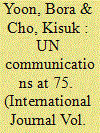

|
|
|
|
|
| Summary/Abstract |
In the age of globalization, the UN Department of Public Information (DPI) is expected to play an active role in communicating with citizens the world over. This study explores the DPI’s evolution over the last 75 years, tackling the nature of organizational change in what is too often dismissed as a hidebound and conservative institution. The authors use textual analysis of UN documents combined with Grunig and Hunt’s four public relations (PR) models to track the DPI’s transformation from an organization that favoured the one-way dissemination of objective information to an institution ready to embrace two-way symmetric public relations. Though useful, these models were unable to explain the driving forces behind the DPI’s transition from one model to another or detailed changes within models at a micro level. To remedy this, the authors incorporate Harry Nyström’s basic model of organizational innovation illuminating incremental changes within the DPI between 1946 and 1989, as well as the transformative changes that were driven by the end of the Cold War, new communications technologies, and Kofi Annan’s leadership in the 1990s and 2000s.
|
|
|
|
|
|
|
|
|
|
|
|
|
|
|
|
| 8 |
ID:
188468


|
|
|
|
|
| Summary/Abstract |
TWO ANNIVERSARIES in 2022 received little attention because of global turbulence but symbolized events whose significance is hard to overestimate. They were two interrelated forums - the United Nations Conference on the Human Environment in Stockholm (June 5-16, 1972), also known as the Stockholm Conference, and the UN Conference on Environment and Development (UNCED) in Rio de Janeiro (June 3-14, 1992), informally called the Earth Summit. These two conferences laid the basis for the concept of sustainable development and the process of implementing it.
|
|
|
|
|
|
|
|
|
|
|
|
|
|
|
|
| 9 |
ID:
192428
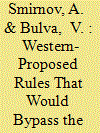

|
|
|
|
|
| Summary/Abstract |
THE West is drawing up rules for cyberspace that would circumvent the UN and other organizations and formats bringing together practically all countries of the world, and this plays a special role in the context of the vast hybrid war unleashed by the West against Russia and its allies. Unlike the legally binding norms that Russia and its allies insist on, these rules are meant to be nothing more than recommendations and are normally drafted by narrow groups of nations loyal to the US.
|
|
|
|
|
|
|
|
|
|
|
|
|
|
|
|
| 10 |
ID:
155708
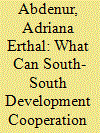

|
|
|
|
|
| Summary/Abstract |
Until it began waning due to economic crisis and political turmoil on the domestic front, in Brazil’s rapidly expanding South-South development, cooperation often has been promoted by government officials as contributing to stability and prosperity in partner states. It is unclear, however, how this development cooperation intersects with the country’s involvement in UN peace operations. This article examines the role of Brazilian South-South technical cooperation across two contexts. In Haiti, Brazil has led the military component of the MINUSTAH, whereas in Guinea-Bissau, it has helped to spearhead peacebuilding efforts by the international community. In both cases, Brazil has tried to substantiate its critique of the UN’s securitization by providing technical cooperation across a variety of sectors. The analysis shows that this cooperation is too fragmented, subject to interruptions, and disconnected from UN-led efforts to make a considerable contribution to a sustainable peace. However, better internal coordination and stronger ties to UN initiatives could boost the contribution of Brazil’s Brazilian South-South development cooperation to a lasting peace.
|
|
|
|
|
|
|
|
|
|
|
|
|
|
|
|
| 11 |
ID:
181350


|
|
|
|
|
| Summary/Abstract |
FIVE months have passed since the inauguration of Joe Biden as the 46th president of the United States, and in this time, the US has faced a variety of domestic and foreign challenges requiring a quick response from the White House. This response, both on its own but especially in comparison with the actions of the Obama and Trump administrations in similar situations, provides ample material for analyzing the behavior patterns of the new American leadership.
|
|
|
|
|
|
|
|
|
|
|
|
|
|
|
|
|
|
|
|
|